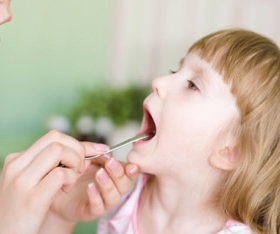Article at a Glance
While they both make your throat hurt, a sore throat and strep throat are caused by two very different things and require two different kinds of treatment. Unfortunately it can be tricky to tell the difference between the two.
But one thing they do have in common is how they are spread. Both are spread by coughing, sneezing, touching contaminated surfaces, or sharing utensils or food. Encouraging your children to wash their hands frequently can help keep everybody healthy.
A sore throat is caused by a viral infection. They generally last seven to ten days and get better with some rest. Most often sore throats are part of a cold and are the main symptom for the first 48 hours. If your child develops other symptoms like a cough, hoarseness, red eyes, or runny nose, it is probably a viral infection.
Because it is a viral infection, antibiotics won’t help with the symptoms or shorten the duration of the illness. In fact, they will do more harm than good. Antibiotics can be hard on your body and weaken your immune system.
Strep throat is a bacterial infection caused by streptococcus bacteria and is much less common than a normal sore throat.
Symptoms of strep throat include fever, rash, headache, sore glands, red and white patches in the throat, swollen tonsils, puss on the tonsils, difficulty swallowing, abdominal pain, nausea, and loss of appetite.
While a normal sore throat can be easily treated at home, you will want to call your pediatrician if you think your child has strep throat.
Call your pediatrician as soon as possible if you notice any of the following.
If you think it is strep throat, see your pediatrician. During your appointment, your pediatrician will probably do a strep test to determine if it is strep or not. If it is, your child will be prescribed a round of antibiotics. But if it is a viral cold, antibiotics will not be helpful because they only work on bacteria.
It is important to take the full round of antibiotics, even if your child is feeling better. Stopping too soon can cause the infection to return and create antibiotic resistant bacteria. Not finishing the antibiotics or not seeking treatment can lead to problems like rheumatic fever (which can lead to heart disease), blood infections, kidney disease, or scarlet fever.
After about 24 hours of taking antibiotics, your child will most likely not be contagious. If left untreated, strep throat can be contagious for as long as 21 days.
Have your child drink plenty of liquids like water, apple juice, or ginger ale. Avoid acidic drinks like orange juice. Warm liquids like chicken broth or hot chocolate can be soothing; but so can milk shakes, cold drinks, and popsicles. Older children can try sucking on hard candy or gargling with salt water. Until the symptoms clear up, it may be a good idea to stick to a soft diet as solid foods may be hard to swallow.
Pain relievers like acetaminophen or ibuprofen can be helpful for severe throat discomfort or fevers greater than 102° F.
The best way to prevent strep throat is through good hygiene, especially washing your hands and covering your mouth when coughing or sneezing. If somebody in your home has strep throat, be sure not to share food and keep eating utensils separate from others. And after finishing the round of antibiotics, throw away your child’s toothbrush and get a new one.
More information on how to treat a sore throat or when to see your pediatrician
